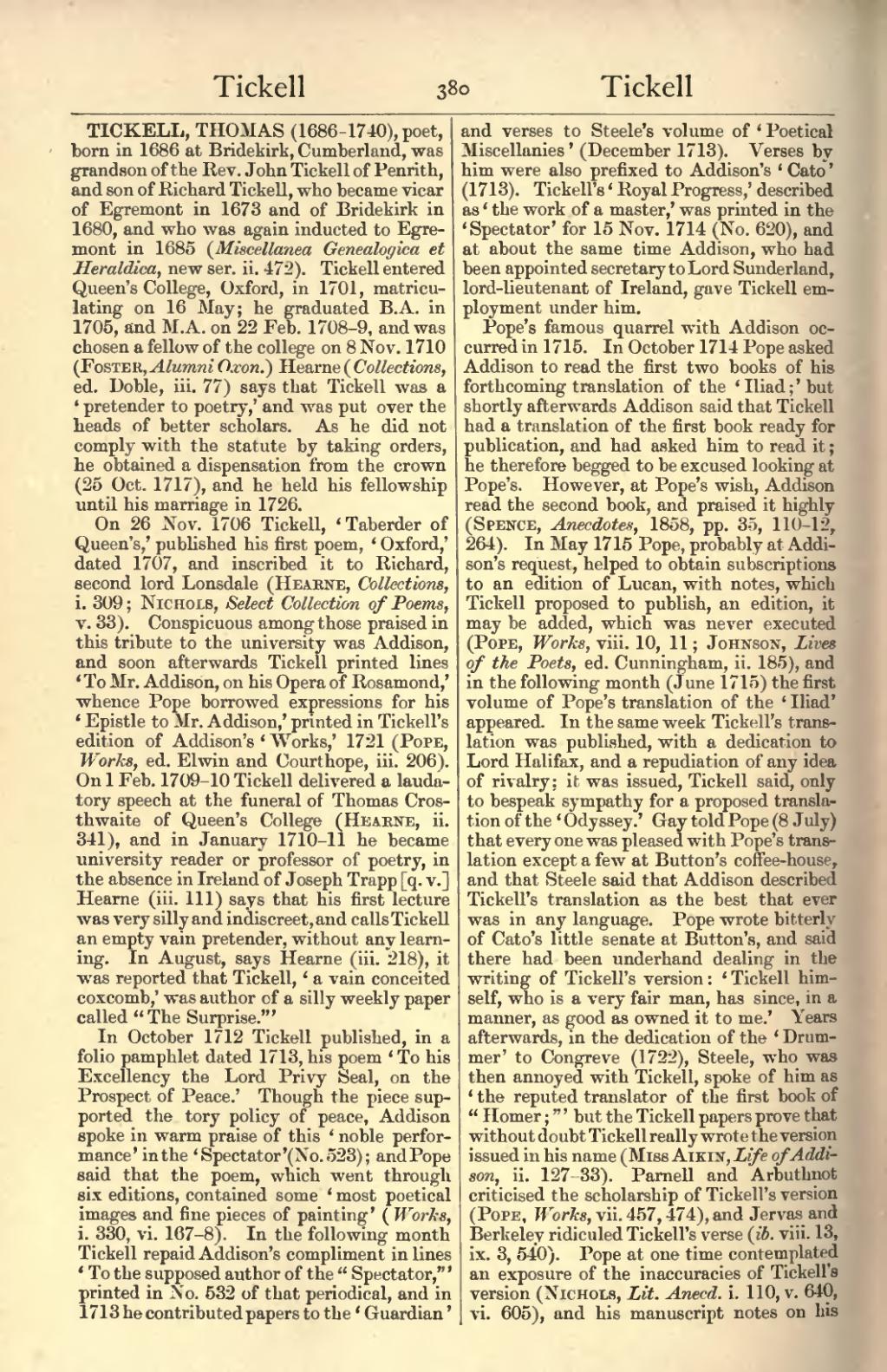TICKELL, THOMAS (1686–1740), poet, born in 1686 at Bridekirk, Cumberland, was grandson of the Rev. John Tickell of Penrith, and son of Richard Tickell, who became vicar of Egremont in 1673 and of Bridekirk in 1680, and who was again inducted to Egremont in 1685 (Miscellanea Genealogica et Heraldica, new ser. ii. 472). Tickell entered Queen's College, Oxford, in 1701, matriculating on 16 May; he graduated B.A. in 1705, and M.A. on 22 Feb. 1708–9, and was chosen a fellow of the college on 8 Nov. 1710 (Foster, Alumni Oxon.) Hearne (Collections, ed. Doble, iii. 77) says that Tickell was a ‘pretender to poetry,’ and was put over the heads of better scholars. As he did not comply with the statute by taking orders, he obtained a dispensation from the crown (25 Oct. 1717), and he held his fellowship until his marriage in 1726.
On 26 Nov. 1706 Tickell, ‘Taberder of Queen's,’ published his first poem, ‘Oxford,’ dated 1707, and inscribed it to Richard, second lord Lonsdale (Hearne, Collections, i. 309; Nichols, Select Collection of Poems, v. 33). Conspicuous among those praised in this tribute to the university was Addison, and soon afterwards Tickell printed lines ‘To Mr. Addison, on his Opera of Rosamond,’ whence Pope borrowed expressions for his ‘Epistle to Mr. Addison,’ printed in Tickell's edition of Addison's ‘Works,’ 1721 (Pope, Works, ed. Elwin and Courthope, iii. 206). On 1 Feb. 1709–10 Tickell delivered a laudatory speech at the funeral of Thomas Crosthwaite of Queen's College (Hearne, ii. 341), and in January 1710–11 he became university reader or professor of poetry, in the absence in Ireland of Joseph Trapp [q. v.] Hearne (iii. 111) says that his first lecture was very silly and indiscreet, and calls Tickell an empty vain pretender, without any learning. In August, says Hearne (iii. 218), it was reported that Tickell, ‘a vain conceited coxcomb,’ was author of a silly weekly paper called “The Surprise.”’
In October 1712 Tickell published, in a folio pamphlet dated 1713, his poem ‘To his Excellency the Lord Privy Seal, on the Prospect of Peace.’ Though the piece supported the tory policy of peace, Addison spoke in warm praise of this ‘noble performance’ in the ‘Spectator’ (No. 523); and Pope said that the poem, which went through six editions, contained some ‘most poetical images and fine pieces of painting’ (Works, i. 330, vi. 167–8). In the following month Tickell repaid Addison's compliment in lines ‘To the supposed author of the “Spectator,”’ printed in No. 532 of that periodical, and in 1713 he contributed papers to the ‘Guardian’ and verses to Steele's volume of ‘Poetical Miscellanies’ (December 1713). Verses by him were also prefixed to Addison's ‘Cato’ (1713). Tickell's ‘Royal Progress,’ described as ‘the work of a master,’ was printed in the ‘Spectator’ for 15 Nov. 1714 (No. 620), and at about the same time Addison, who had been appointed secretary to Lord Sunderland, lord-lieutenant of Ireland, gave Tickell employment under him.
Pope's famous quarrel with Addison occurred in 1715. In October 1714 Pope asked Addison to read the first two books of his forthcoming translation of the ‘Iliad;’ but shortly afterwards Addison said that Tickell had a translation of the first book ready for publication, and had asked him to read it; he therefore begged to be excused looking at Pope's. However, at Pope's wish, Addison read the second book, and praised it highly (Spence, Anecdotes, 1858, pp. 35, 110–12, 264). In May 1715 Pope, probably at Addison's request, helped to obtain subscriptions to an edition of Lucan, with notes, which Tickell proposed to publish, an edition, it may be added, which was never executed (Pope, Works, viii. 10, 11; Johnson, Lives of the Poets, ed. Cunningham, ii. 185), and in the following month (June 1715) the first volume of Pope's translation of the ‘Iliad’ appeared. In the same week Tickell's translation was published, with a dedication to Lord Halifax, and a repudiation of any idea of rivalry; it was issued, Tickell said, only to bespeak sympathy for a proposed translation of the ‘Odyssey.’ Gay told Pope (8 July) that every one was pleased with Pope's translation except a few at Button's coffee-house, and that Steele said that Addison described Tickell's translation as the best that ever was in any language. Pope wrote bitterly of Cato's little senate at Button's, and said there had been underhand dealing in the writing of Tickell's version: ‘Tickell himself, who is a very fair man, has since, in a manner, as good as owned it to me.’ Years afterwards, in the dedication of the ‘Drummer’ to Congreve (1722), Steele, who was then annoyed with Tickell, spoke of him as ‘the reputed translator of the first book of “Homer;”’ but the Tickell papers prove that without doubt Tickell really wrote the version issued in his name (Miss Aikin, Life of Addison, ii. 127–33). Parnell and Arbuthnot criticised the scholarship of Tickell's version (Pope, Works, vii. 457, 474), and Jervas and Berkeley ridiculed Tickell's verse (ib. viii. 13, ix. 3, 540). Pope at one time contemplated an exposure of the inaccuracies of Tickell's version (Nichols, Lit. Anecd. i. 110, v. 640, vi. 605), and his manuscript notes on his
